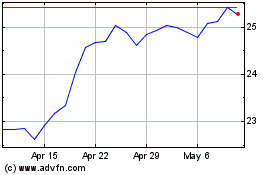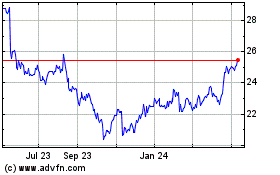By Jesse Newman and Annie Gasparro
The coronavirus pandemic is deepening challenges for the U.S.
food system, forcing plant closures and infecting farmworkers at a
time when packaged-food companies say demand for groceries has
never been higher.
Production has been curtailed at a range of facilities across
the country, including a Kraft Heinz Co. macaroni-and-cheese plant
and a Conagra Brands Inc. frozen-meal factory. At the same time,
food companies are instituting precautions to maintain or restore
production so they can to keep grocery stores stocked.
Conagra said 20 of the 700 workers at its factory in Missouri
that makes chicken pot pies and other frozen meals had contracted
the virus, prompting the plant to close for 10 days beginning April
17. A spokesman said the company needs the time to conduct a deep
cleaning and prepare more rigorous preventive measures for when
employees return to the plant.
Flowers Foods Inc. said it closed a baking plant in Tucker, Ga.,
for a few weeks this month after workers tested positive for the
virus. The company, whose brands include Wonder Bread and
Tastykake, wouldn't say how many of the plant's 255 workers were
sick.
The disruptions come amid heightened worry over the nation's
food supply chain as illnesses close meatpacking plants, curtailing
output of chicken, beef and pork and limiting supplies at grocery
stores. Pork giant Smithfield Foods Inc. has shut down its Sioux
Falls, S.D., plant, which with hundreds of infected workers has
become a major coronavirus hot spot.
To help shore up the food supply chain and help farmers hurt by
collapsing commodity prices and restaurant demand, the Trump
administration last week pledged to spend $19 billion in direct
payments to farmers and ranchers as well as government food
purchases.
Even as the new coronavirus forces more plant closures, some
facilities that had been closed because of the outbreak are
reopening. In Pennsylvania this week, meatpacking facilities run by
Cargill Inc., JBS USA Holdings Inc. and Empire Kosher Poultry Inc.
will ramp back up with new safeguards. The measures include
footprints painted on the floor to mark recommended distances
between employees, and tents set up for extra cafeteria seating,
company and union officials said.
Food makers outside the meat sector were initially able to avoid
factory closures when the coronavirus began spreading throughout
the U.S. in March. They say the production process for packaged
food is typically more automated than work done on farms,
slaughterhouses and meatpacking plants.
Companies such as Kraft Heinz, Danone SA and General Mills Inc.
also took safety steps, including taking workers' temperatures and
slowing production where necessary to allow for wider spacing and
fewer workers on manufacturing.
Nonetheless, packaged-food executives are growing concerned
about mounting illnesses at their plants and those in their supply
chain.
"Everyone is most worried about factory workers," said Patrick
Criteser, chief executive of Tillamook County Creamery Association.
"We can find different packaging-materials or raw-materials
suppliers, but we need those plants to keep operating."
Tillamook, a dairy cooperative based in Oregon, has implemented
new safety measures in its plant, which helped keep the one
Covid-19 case recorded there from infecting more people. That
employee has recovered from the coronavirus disease and is back at
work, Mr. Criteser said.
Kraft Heinz's macaroni-and-cheese factory in Springfield, Mo.,
reported two Covid-19 cases last month and closed for a few days
for cleaning. Campbell Soup Co. said its Pepperidge Farm bakery in
Denver, Pa., had five cases and "paused certain operations" for a
deep cleaning. A Frito-Lay factory in Modesto, Calif., shut down
for a couple of days for a deep cleaning after an undisclosed
number of workers contracted the virus. Frito-Lay, owned by PepsiCo
Inc., employs 600 people there.
Workers are also falling ill on farms that supply packaged-food
companies. Three agricultural workers in Cayuga County in western
New York, for instance, tested positive for the new coronavirus,
one of whom -- a man in his 40s who worked on a dairy farm -- has
died.
The department says it has conducted contact tracing on farms
and that a team of nurses has traveled to farms to test symptomatic
employees.
A North Carolina farmworker also tested positive, according to
an email from a regional health clinic viewed by The Wall Street
Journal. The worker was quarantined and is recovering, the email
said.
The regional clinic has prepared hundreds of Covid-19
information packets in English and Spanish, as well as handmade
masks and a supply of gloves, for distribution to farmworkers
through a faith-based group. The clinic is planning a Zoom
conference for local farmers to provide information about the
pandemic and is opening its coronavirus help line to farmers.
Across the country, the busy spring season is starting to bring
thousands of workers to farms where they live and work in close
proximity to one another. In North Carolina last year, nearly
22,000 migrant workers, largely from Mexico, joined others on farms
to harvest crops including tobacco, sweet potatoes and
cucumbers.
Some farms and labor contractors have been working to prevent
the virus's spread by checking migrant workers' temperatures before
they cross the U.S.-Mexico border, spacing workers further apart in
fields and delivering groceries to housing camps.
The Trump administration in recent weeks has taken steps to make
it easier for farms to hire migrant workers. It also pledged $16
billion in payments to farmers and ranchers and $3 billion in mass
commodity purchases to be distributed through food banks.
Cattle ranchers, dairy and hog farmers are set to receive $9.6
billion in direct payments, while row crop farmers will receive
$3.9 billion and specialty-crop producers will get $2.1 billion,
according to John Hoeven (R, N.D.), chairman of the Senate
Agriculture Appropriations Committee.
Farm groups welcomed the relief program, but said it isn't
enough to offset plunging commodity prices and demand from
restaurants. Hog farmers will receive $1.6 billion in direct
payments, though the National Pork Producers Council estimates
industrywide losses for the rest of the year will total $5 billion
as farmers lose $37 per hog they market.
Joe Glauber, former chief economist at the U.S. Department of
Agriculture, said also that he had hoped some federal funds would
be dedicated to preventing illnesses in the nation's food
plants.
--Jacob Bunge contributed to this article.
Write to Jesse Newman at jesse.newman@wsj.com and Annie Gasparro
at annie.gasparro@wsj.com
(END) Dow Jones Newswires
April 20, 2020 15:03 ET (19:03 GMT)
Copyright (c) 2020 Dow Jones & Company, Inc.
Flowers Foods (NYSE:FLO)
Historical Stock Chart
From Oct 2024 to Nov 2024

Flowers Foods (NYSE:FLO)
Historical Stock Chart
From Nov 2023 to Nov 2024
